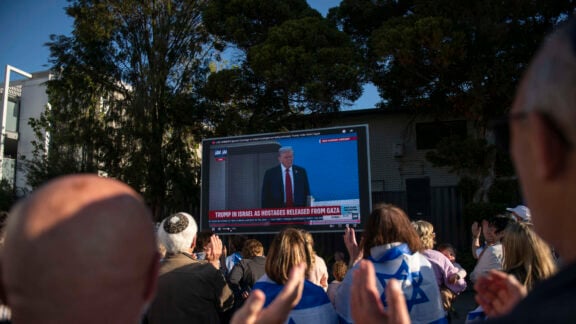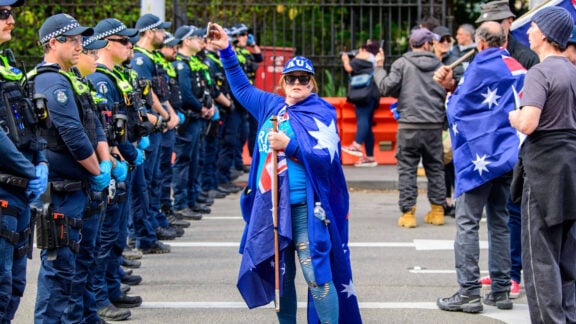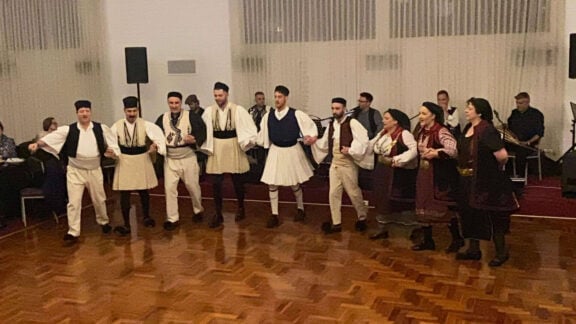Ana Kokkinos is home again! Her latest film Blessed, is a tragic manifestation of Australia’s suburban reality.
We all judge easily, but at the end of the day we are human with a heart that ticks. We discover the strengths and fragility of these characters.
– Ana Kokkinos –
Kokkinos takes on the subject of mothers and children, a subject that can often plunge a filmmaker into kitsch melodrama. Yet, she creates a harrowing and moving cinematic journey.
After the preview screening I was desperate to rush home and repeatedly assure my seven-year-old son that I love him.
Kokkinos is aware of the complex reactions audiences will have towards Blessed.
“At a cast screening recently one of the mothers whose child was in the film came out and said ‘I loved the film and it was full of joy’, yet some one else said, ‘My god that was devastating’, as a filmmaker I am always intrigued by the way people see my films.”
She seems to have succeeded in raising the real into an opus about ordinary life.
The film takes place over a day andight. It begins with a focus on the children. Katrina played by Sophie Lowe, and Trisha, by Anastasia Baboussouras, are caught shoplifting.
Trisha knows she is loved by her hard-working religious Greek mother, Gina, played by Victoria Haralabidou, but seeks attention as Gina is grieving the absence of her son Roo, played by Eamon Farren. Roo is about to become the reluctant star of a backyard gay porn film.
Katrina, Trisha’s partner in crime, wants a mother not a friend which is what the pokies addicted Bianca, performed by Miranda Otto, has become.
Orton, Reef Ireland, and Stacey, Eva Lazzaro, are morphing into street urchins, while their mother Rhonda played vividly by Frances O’Connor, is pregnant and has the Department of Human Services on her back.
Daniel, brought to life by Harrison Gilbertson, is disconnected from his over-worked mother and morose, unemployed father, played with minimalist intensity by William McInnes.
Daniel decides to rob an old woman’s house with tragic consequences.
The second half of the film focuses on the mothers. It complicates our instinctive prejudices that have by now become solidified by the first half. It adds flesh and feeling to the mothers, making them real, human and sadly understandable.
Kokkinos wants the audience “to make judgements” in the first half of the film.
She says, “in the second half of the film we discover more about the mothers and we develop views about each character and our perception of those mothers changes.”
She is responsive to the way class, cultural and moral determinants give birth to our prejudices.
“We all judge easily but at the end of the day we are human with a heart that ticks. We discover the strengths and fragility of these characters.”
Ana Kokkinos has no fear of tackling class, particularly in an Australia where ‘class’ has become unmentionable, unless it is in the insipid political speak of “working families” or “battlers”.
The characters in Blessed belong to the growing number of working class and lower middle-class families inhabiting Australia’s sprawling suburbs.
“They are disparate families” says Kokkinos, “whereas Rhonda is slipping into the lower welfare class, Gina is part of an aspirant Greek family which is striving to do the best they can for their families.”
“Trisha is a wog girl who knows who she is and is prepared to stand up for herself”, says Kokkinos, adding, “When the cop says ‘you’re trash’, she stands up for herself and says ‘you can’t say that, you can’t say that!’ She gives something very pure, as Anastasia said to me ‘as wogs we are not going to take it.’”
The film, as Kokkinos reminds me, “is about the precious connection between mothers and children.”
She has mined a rich vein of material by Andrew Bovell, Melissa Reeves, Patricia Cornelius and Christos Tsiolkas, to create an elegiac and convincing film.
Kokkinos though, at one point of the production needed something to meld these text. Two lines were found that brought it all together, ‘They’re my blessings. You are not to touch them!’
These two lines are suspended by Rhonda’s tormented screams after the catastrophic end of her children’s journey into the night.
Blessed is Ana Kokkinos’ child, “It’s my blessing,” she says,”I am immensely proud of the work.” But, as Kokkinos recognises, is also a child of the ensemble of actors who moulded the characters.
“A director can guide a piece of work and bring it to fruition but it is the performances in the end, it was a truthful not a superficial commitment, Miranda Otto, Frances O’Connor, Deborra-Lee Furness, Victoria [Haralabidou], all of them… they waded into the material because there was a vision for the work.”
Blessed is a ultimately a Greek tragedy, “There is catharsis, it is all Greek tragedy if you go back to the 4000 years of storytelling… Fate brings you to the point but the reality is that all these characters are not sitting around whining, they are completely engaging with each other.”
A shattering vision of the Aboriginal adult James, (a rich yet understated performance by Wayne Blair), crying for his white mother, whom he rejected, as well as the black mother he never met, has seared itself in my psyche.
“He had two mothers and in the end no mother at all” says Ana Kokkinos.
Blessed is an ancient story and a necessary one.
Blessed is screening in the Melbourne International Film Festival and will have its national release in September.









